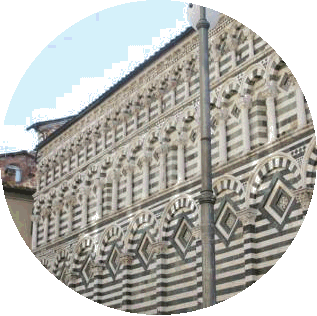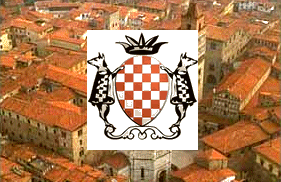     |
 DISCOVERING
PISTOIA DISCOVERING
PISTOIA
S. GIOVANNI
FUORCIVITAS
 The
church consecrated to Saint John the Evangelist was called Fuorcivitas
because it was built outside the Medieval city wall. The
church consecrated to Saint John the Evangelist was called Fuorcivitas
because it was built outside the Medieval city wall.
Some local historians have dated the construction back to the period of
Lombard rule but this hypothesis is unsupported by documentation. The
church was definitely built by the early twelfth century and consisted
of an apse and a single nave, much smaller than what can be seen today.
Of the early form we can still see the original facing in different
colored marbles and the side door which has an architrave sculpted with
the Last Supper signed by Gruamonte.
The church, officiated by a college of priests that lived in the
cloister, remained under the direction of the rectory of Prato until the
mid thirteenth century when it regained its autonomy. The original
structure was modified during the fourteenth century when the nave was
lengthened and widened. At the same time the front was made on what is
today via Crispi, and part of the Romanesque cloister was torn down to
make way for the new southern wall with its large Gothic windows. During
the 1300s San Giovanni underwent such great works that it attracted
famous artists who transformed it into one of the most important
churches in the city. The high quality of the work is seen not only in
the art but also in an important document of mid century that refers to
how the Opera di San Giovanni intended to involve the best artists of
the time in the project. These included: Fra' Guglielmo di Pisa who
sculpted the reliefs on the pulpit,
perhaps Giovanni Pisano who may have made the basin for holy water; the
Master of 1310 who probably began his career with the frescos in
the choir; Taddeo Gaddi who left the triptych of the Madonna Enthroned
between the saints Jacopo, John the Evangelist, Peter and John the
Baptist Giovanni Cristiani who painted the Scenes of Saint John the
Evangelist. The church, precious for the important works of art that it
houses, also contains the Visitation C, one of Luca della Robbia's
masterpieces , today located in a niche on the northern wall, as well as
a rare thirteenth century Crucifix.

PISTOIA
PHOTOGALLERY
PISTOIA CITY MAP
|

